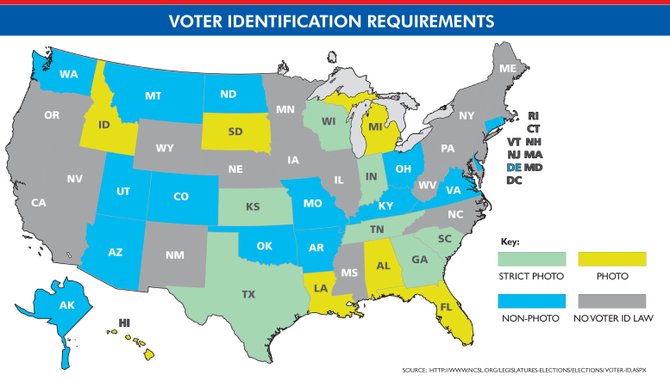Voter ID Laws Weakened in Arizona, Opens Door for More Legal Challenges

The need for voter ID laws is a contentious and politically driven argument that tends to crop up around election years following the passage of the first voter ID law in Indiana in 2006. Prior to 2006, not a single state had enacted a law that would require a citizen to bring a government-issued photo ID with them in order to vote. The law was upheld by the Supreme Court two years after its passing.
Many states had laws that required voters to provide some form of identification, but narrowing the requirement to a government-issued photo ID made this case different.
Since its passing, 31 states now have voter ID laws of varying strictness, but many people maintain that these laws restrict the rights of those who would wish to vote and violate the Voting Rights Act of 1965. The Voting Rights Act stands as a check against states seeking to enact restrictive voting laws. Section 5 of the VRA requires states with a history of discrimination to file an appeal with the Department of Justice before the state's legislature can amend its voting laws.
However, despite this check, some would argue that voter ID laws still disenfranchise potential voters.
Voter ID laws impact certain groups more than others. The elderly, youth, and minority groups are all much less likely to have a government-issued photo ID available and therefore are less likely to vote.
This is a problem for two reasons: It means a less diverse voting population during election years and an increased financial burden which some would view as a poll tax. The idea of these laws creating a poll tax is not a new one and has been used many times over the last ten years in the effort to fight voter ID laws.
Last week, the Supreme Court ruled against a voter ID law in Arizona requiring voters to provide proof of citizenship on top of their standard voter ID. As brought forward by the majority statement, the law placed a more arduous restriction on the right to vote instead of allowing Arizona citizens to simply use the federal form that provided proof of citizenship. The ruling effectively gives voters in Arizona two means of registering to vote: the state system with its many requirements and the less strenuous federal system.
What this ruling means for voter ID laws as a whole still remains to be seen. The context of these laws is important when considering future litigation against them.
While the ruling means voters in Arizona will have an easier time registering to vote, it does not make a greater statement about the condition of the 30 other states which still have similar laws. The legal precedent set by this case is states cannot produce laws that place undue restrictions on voter registration beyond what is expected of voters through the federal process.
This can leave the door open for similar appeals against strict voter ID laws in other states, but the process will be slow.




